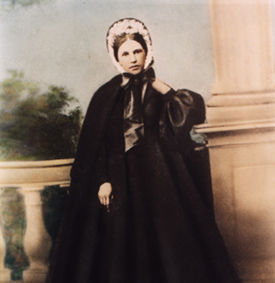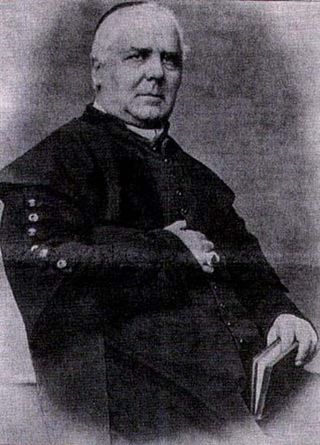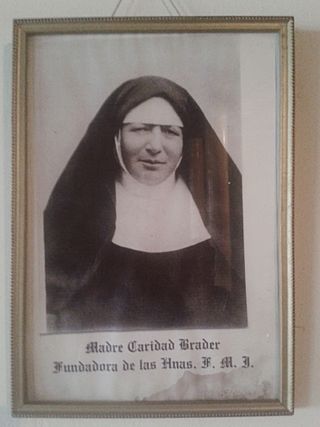Related Research Articles

Blessed Anton Martin Slomšek was a Slovene Roman Catholic prelate who served as the Bishop of Lavant from 1846 until his death. He served also as an author and poet as well as a staunch advocate of the nation's culture. He served in various parishes as a simple priest prior to his becoming a bishop in which his patriotic activism increased to a higher degree since he advocated writing and the need for education. He penned textbooks for schools including those that he himself opened and he was a vocal supporter of ecumenism and led efforts to achieve greater dialogue with other faiths with an emphasis on the Eastern Orthodox Church.

Giovanni Antonio Farina was an Italian Catholic bishop known for his compassionate treatment of the poor and for his enlightened views of education; he was sometimes dubbed as the "Bishop of the Poor". He served as the Bishop of Vicenza and later as the Bishop of Treviso; he is also known for ordaining the future Pope Pius X to the priesthood.

Pius of Saint Aloysius was an Italian Roman Catholic professed cleric from the Passionists. He died before he could receive his ordination to the priesthood but in his short life managed to captivate people around him for his strong dedication to his order's charism and his deep faith.

Maria Franciszka Siedliska, also known by her religious name Maria of Jesus the Good Shepherd, was a Polish Roman Catholic professed religious and the founder of the Sisters of the Holy Family of Nazareth. In childhood Siedliska was indifferent to her faith but after a local priest had converted her she became aware of a call to the religious life which her parents opposed. However the death of her father in 1870 enabled her to pursue her vocation. In 1873 she decided to found a religious congregation that received the blessing of Pope Pius IX before being established during Advent in 1875. Siedliska expanded her congregation from Rome to her native Poland and elsewhere, including Great Britain, France and the USA where she visited during her extensive travels.

Josep Manyanet i Vives, SF was a Spanish Roman Catholic priest and the founder of the Sons of the Holy Family and the Missionary Daughters of the Holy Family. He served in a range of capacities as a parish priest before establishing both religious orders in order to spread devotion to the Holy Family to whom he fostered an intense devotion.
Luigi Talamoni was an Italian Roman Catholic priest and the founder of the Merciful Sisters of Saint Gerard. Talamoni also held civic office for a brief period though later resigned due to the rise of Fascism in the area and dedicated his career to proper care for the poor and to the maintenance of civic infrastructure. His beatification was celebrated in 2004.

Maria Domenica Mantovani was an Italian Roman Catholic professed religious, and the co-founder of the Little Sisters of the Holy Family; she established them alongside Giuseppe Nascimbeni. As a nun she received the religious name of Maria of the Immaculate.
Gaetana Sterni was an Italian Roman Catholic professed religious and the founder of the Sisters of Divine Will. Sterni's life became marred due to the deaths of close relations including her husband and sole child which prompted her to look towards an apostolate to aid others and to ease others' sufferings. The order she founded was dedicated to total consecration to Jesus Christ and to an active apostolate of evangelic zeal.

Giovanni Calabria was an Italian Roman Catholic priest who dedicated his life to the plight of the poor and the ill. He established two congregations, the Poor Servants of Divine Providence and the Poor Sisters Servants of Divine Providence to take better care of poor people in various Italian cities and later abroad while underpinning the need to promote the message of the gospel to the poor.

Assunta Marchetti was an Italian Roman Catholic religious sister and the co-founder of the Missionary Sisters of Saint Charles Borromeo Scalabrinians; she worked in Brazil from 1895 until her death. She has been beatified as a Blessed Mother. Her priest brother Giuseppe is titled as Venerable on the path to sainthood.
Luca Passi was an Italian priest and the founder of the Teaching Sisters of Saint Dorothy. Two brothers of his were priests – following the example of their paternal uncle – and Passi himself moved to Venice in order to dedicate himself to both his preaching and educational missions.

Domenico Lentini was an Italian Roman Catholic priest. He was ordained in 1794 and was a life-long parish priest in his hometown of Potenza where he promoted Eucharistic devotion and worked alongside the poor of the area. He also fostered education and evangelization and often taught parishioners catechism and literature while making himself available to hear the confessions of penitents.

Giuseppe Nascimbeni was an Italian Roman Catholic priest who exercised his pastoral mission in his home of Verona and who also established the Little Sisters of the Holy Family.

Zefirino Agostini was an Italian Roman Catholic priest that served in his hometown of Verona to perform his pastoral duties. He established two religious congregations in his lifetime being the Pious Union of Sisters Devoted to Saint Angela Merici and the Ursuline Sisters of the Daughters of Mary Immaculate.

Blessed Luigi Monza was an Italian Roman Catholic priest and the founder of the Secular Institute of the Little Apostles of Charity. Monza's pastoral mission was defined with catering to the needs of the poor and the sick and used his new congregation as a means of spreading this mission.
Francesco Spinelli was an Italian Roman Catholic priest and the founder of the Sisters Adorers of the Blessed Sacrament. Spinelli became close contemporaries of Geltrude Comensoli and Luigi Maria Palazzolo and had a previous collaboration with Comensoli in which the two established a religious institute in Bergamo before a rift between members caused Spinelli to distance himself from its work and leave.

Pietro Bonilli was an Italian Roman Catholic priest and the founder of the Sisters of the Holy Family of Spoleto. Bonilli served as a diocesan priest for his entire life in both Trevi and Spoleto while using his order to reach out to orphans and homeless people.

Louis-Antoine-Rose Ormières Lacase was a French Roman Catholic priest from the Diocese of Carcassonne and the founder of the Sisters of the Guardian Angel - an order dedicated to the care of children and the educational needs of the poor.
Elisabetta Maria Satellico – in religious Maria Crocifissa – was an Italian Roman Catholic professed religious from the Poor Clares who served as her convent's abbess.

Maria Josefa Karolina Brader, also known by her religious name Maria Caridad of the Holy Spirit, was a Swiss religious sister who founded the Franciscan Sisters of Mary Immaculate. Brader served as a member of the missions in Ecuador for a brief period of time before being transferred to Colombia where she served as a catechist and evangelizer for the remainder of her life.